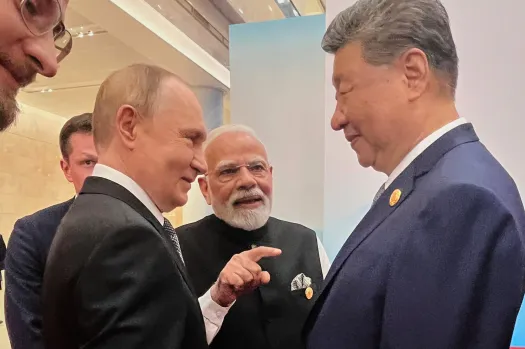
By : Nedal Zubeidi
Jordan Daily – Summits are not always measured by the length of their final communiqués or the size of leaders’ photo-ops. Sometimes a single scene, or a passing remark, tells the real story behind the protocol. At the Shanghai Cooperation Organization (SCO) summit of 2025, it seemed India had decided to sip from the Chinese teacup after growing frustrated of the bitter tariffs served by Washington.
India has long sought balance. Since Jawaharlal Nehru, it raised the banner of “non-alignment” during the Cold War, yet it often found itself pushed toward one bloc or the other. In the 1990s it leaned West in pursuit of technology and investment. More recently it was hailed in Washington as the “democratic ally” to counter China. But the United States does not always treat its partners gently. President Donald Trump imposed steep tariffs on Indian exports, turning a partner into an adversary. It was only natural, then, for New Delhi to join the eastern table, shaking hands with Moscow and smiling at Beijing.
The SCO is not new. It has existed for nearly a quarter of a century, yet for much of that time it remained more a forum for speeches than an institution of influence. Leaders met, exchanged warm words, and returned to their domestic concerns. But the 2025 summit carried a different tone. The final statement was blunt: a rejection of unilateral sanctions and outside domination, and a demand that developing countries be given greater weight in the UN Security Council and the IMF. These are words familiar to Arab capitals long weary of Western sermons on democracy and human rights.
The question, however, is whether these words mark a real turning point or just repetition. History suggests that international organizations are not measured by slogans but by their ability to translate politics into interests. The European Union did not emerge as a superpower overnight; it began with coal and steel- concrete cooperation, not rhetoric. If the SCO can shift from talk to trade, from declarations to markets, only then will it become a true alternative to the current world order.
India could be the key. Since the war in Ukraine, it has become a major buyer of Russian oil, defying U.S. pressure. Prime Minister Narendra Modi’s meetings with senior Chinese officials recently also hint at an effort to ease Himalayan border tensions. The tea the two sides once shared years ago has been poured again in Tianjin, though the broken teacup is not yet mended.
For the United States, the equation grows more complex. It wants India as a counterweight to China, yet alienates it with tariffs and trade threats. It wants Russia to retreat from Ukraine, yet sees Moscow embrace Beijing more closely. In the background, North Korea further complicates the calculus.
Vladimir Putin voiced support for Xi Jinping’s initiatives, declaring that the SCO could “play a leading role in shaping a fairer, more balanced world order.” Moscow and Beijing both push for such a new system- one that ends American dominance. But is this a realistic alternative, or only a political wish suspended in the air?
The Shanghai summit may not be remembered for immediate achievements, but it represents a step on a longer journey. Perhaps history will say that the new world order did not begin in Ukraine or Washington, but in a Chinese hall where leaders representing half the world’s population gathered to declare one simple message: the age of single hegemony is over.

